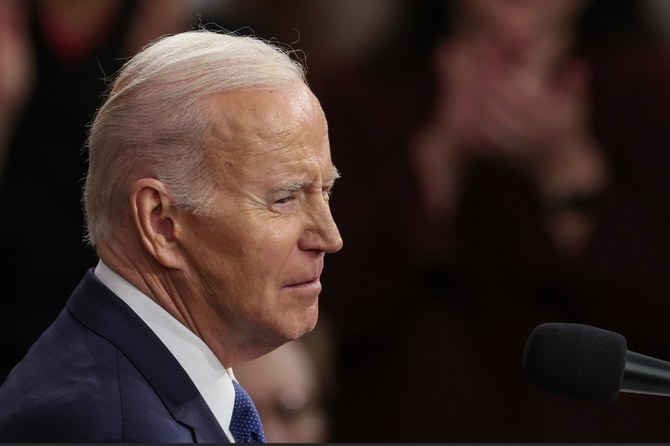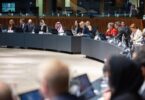Dr. Majid Rafizadeh
At a time when America’s military presence in the Middle East appears to be shrinking and other forces may be looking to fill the vacuum, it is more essential than ever for the Biden administration to work in lockstep with the members of the Gulf Cooperation Council. At this critical time, the Biden administration ought to reconfirm the US’ commitment to Middle Eastern security and aim to strengthen the ties between Washington and the members of the GCC – Saudi Arabia, the UAE, Qatar, Bahrain, Kuwait and Oman – on several fronts, such as the security, geopolitical and environmental landscapes.
President Joe Biden last year pledged that the US is committed to building “political, economic and security connections between the United States – between the US partners wherever possible, while respecting each country’s sovereignty and independent choices … Let me state clearly that the United States is going to remain an active, engaged partner in the Middle East.” Biden added that the US’ objectives “are focused, realistic and achievable, so that we can target our resources, rebuild trust and deliver real results. And we will operate in the context of the Middle East as it is today: a region more united than it has been in years. The GCC is a prime example of that. Former rivals have reestablished diplomatic and economic ties. New memberships are being forged. And increasingly, the world is seeing the Middle East through the lens of opening and opportunity.”
The GCC – which was established with the purpose of strengthening relations between its members, safeguarding their sovereignty and addressing general concerns about their affairs and interests – has become a key international player that is capable of ushering in significant and positive changes, not only in the region but also beyond. Other objectives of the GCC include formulating regulations in various fields, including commerce, customs and communications, education and culture, social and health affairs, information and tourism, and legislative and administrative affairs.
There are many opportunities for increased cooperation between the US and the GCC. One of the critical points of cooperation is security. This not only serves the region, but it also advances US national security interests. As Iowa Republican Sen. Joni Ernst wrote in a letter to National Security Adviser Jake Sullivan last October: “The United States must continue to convene partners, reinforce security dialogue, and develop defense concepts to counter these growing threats … Integrated air and missile defense in the region has been a consistent initiative by US Central Command, with bipartisan support.” She added: “Our roadmap is clear: The United States must continue to engage regional partners to counter common threats … As the security partner of choice, the United States should reliably implement defense efforts and proceed with the US-GCC integrated air and missile defense working group without delay.”
In addition, leaders in the Gulf, as well as the Biden administration, will be keen to find common ground on which they can build positive partnerships in other areas, including climate change. President Biden has frequently made much of his environmental intentions. If we recall, in his initial flurry of executive orders on taking office, a return to the Paris Agreement on climate change was one of the most prominent decisions. The president clearly sees placing climate change high on the agenda as a vote winner, especially among younger, more liberal-minded voters. It is important to point out that some Gulf states, including Saudi Arabia, are leading the way on this issue. As exemplified by the latest developments, climate change is an obvious choice for an interest that is shared by the US and the GCC states. Although some scholars, policy analysts and politicians might think a region that is the oil hub of the world is not an obvious place to look for innovation in green technologies, the region has in fact experienced a shift in its understanding and recognition of the fact that avoiding action on climate change is no longer possible.
For example, Saudi Arabia and Bahrain have pledged to improve the proportion of their energy mixes that come from renewable sources, while the UAE has committed to a 23.5 percent reduction in its greenhouse gas emissions by 2030. However, there also appears to be a growing understanding that technologies such as carbon capture and storage need to be developed to keep the oil industry viable in the long term. Meanwhile, Saudi Arabia has announced hugely ambitious plans to build NEOM, the world’s first city without roads – a clear signal of its intent to adjust course in a more environmentally friendly direction. And Sultan Al-Jaber, the chairman of Masdar, has pointed out that the UAE “aims to play a central role in the emerging green hydrogen economy.” If the Biden administration is searching for another common cause between Washington and the GCC, green issues could provide the answer. Solar power, for example, is an area in which there is obvious common ground. The US is the world’s second-largest producer of solar energy, while the Middle East is an obvious candidate for the mass deployment of solar panels as a source of renewable energy. Furthermore, countries such as Saudi Arabia and the UAE have invested, or are planning to invest, billions of dollars in developing high-tech innovation hubs that could prove attractive to American companies that are interested in developing advanced clean technology. In a nutshell, the Biden administration has opportunities for positive and expanded cooperation with the GCC on several fronts.







